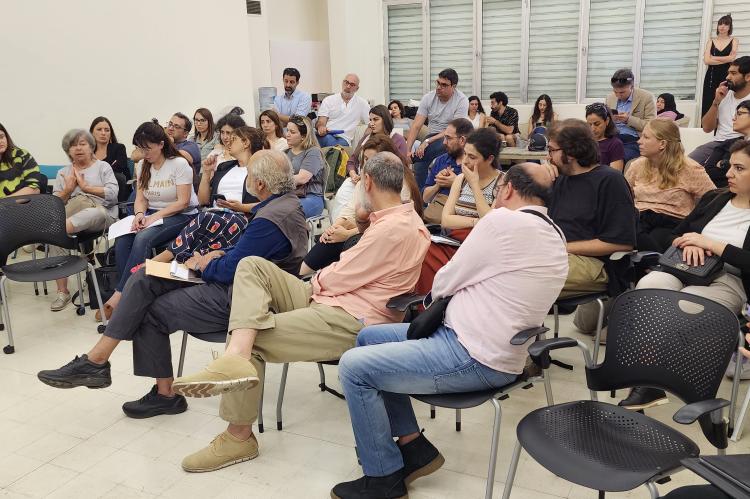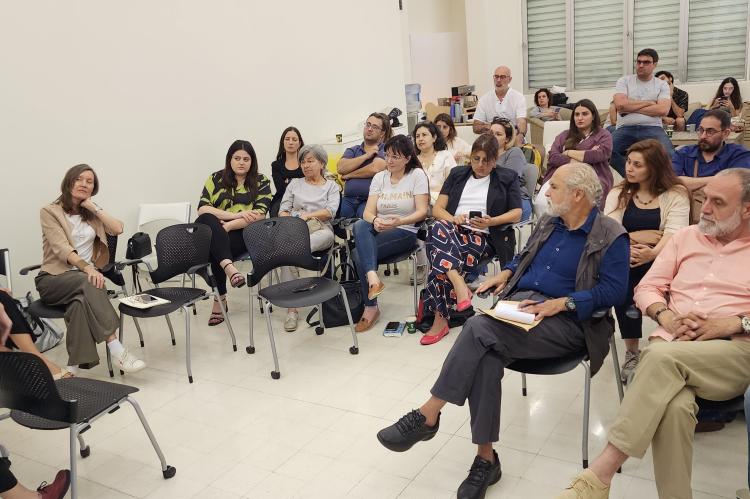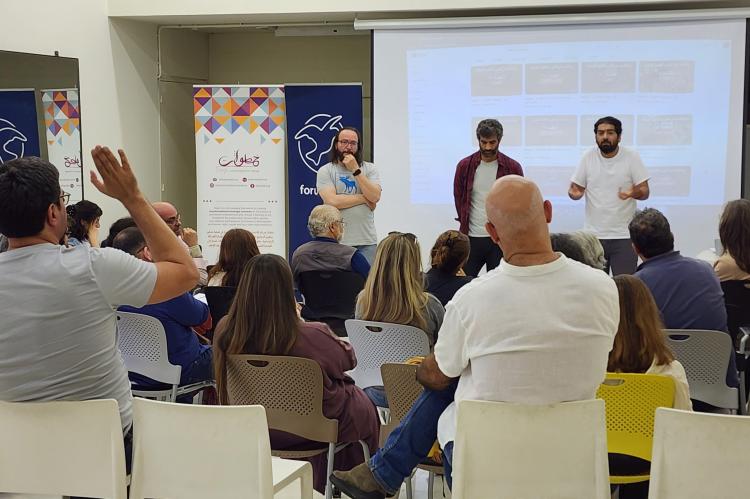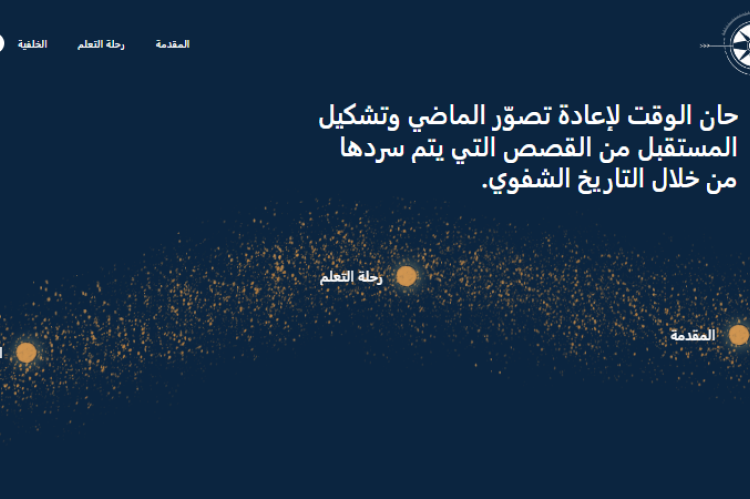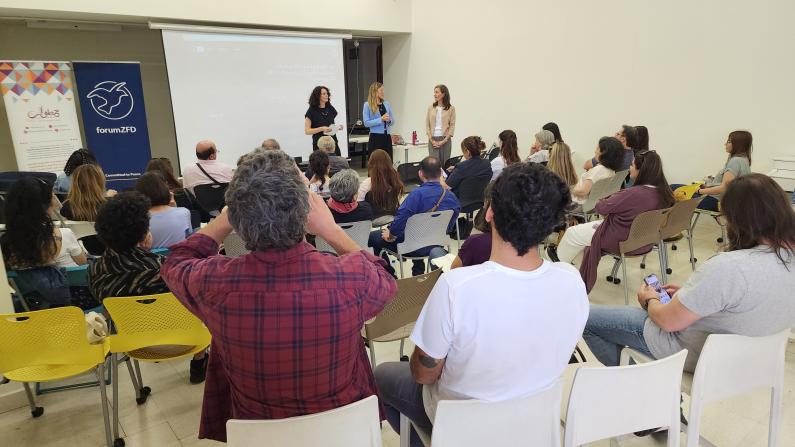
Reimagine the Past is a pioneering inclusive learning guide on Oral History offering alternative approaches to explain history. Spread across three chapters and 24 interactive sessions, it is accessible in both Arabic and English. It serves to a diverse range of users - academics, researchers, activists, or individuals interested in Oral History - making it a versatile tool for facilitators and self-learners alike.
The guides learning journey kicks off with "Setting the Stage" providing an explanation of Oral History essentials, followed by "Conducting the Interview" focusing on the methodological aspects. It then delves into the complexities of the interviewer-narrator relationship in "Doing Oral History". A special section, "The Case of Lebanon", provides insights into conducting historical research in contentious contexts.
Each session has a concise introduction, key questions, and clear learning objectives to enhance this journey. Additional resources, such as timing guidelines, preparatory materials, and tips for facilitators, are also provided. Besides its educational modules, the website boasts a growing collection of Oral History resources, with direct links to various institutions, organizations, and online archives. Furthermore, "Session Handouts" offer condensed readings, summaries, and translations of key resources, making it the largest Arabic language resource for Oral History.
Historian and author Maria Bashshur Abunnasr, along with co-author and producer Jenny Munro from forumZFD, and co-author and design expert Elissa Shamma from Steps Civil Company for Change, led a dynamic and participatory launching event. One of the discussions revolved around the designation of the war - whether it should be referred to as the "Civil War" or the "Lebanese War." This conversation highlighted the nuances inherent in historical narrative and the importance of perspective in interpreting the past.
Reframing Lebanon's History: The Power of Oral Narratives
Why is the "Reimagine the Past" website important? The first of its kind, this bilingual website highlights oral history as a theoretical approach and as a methodology to address contested histories such as Lebanon’s troubled relationship with its past. Instead of the conventional, top-down, single historical narrative, often told from those in positions of power, Oral History allows for the collection of multiple narratives that reflect a myriad of individual experiences to offer a more representative history, told from the bottom-up. Moreover, oral history gives life and meaning to individual stories, in this case of the Lebanese Civil War, an era that touched the lives of countless people caught in extraordinary circumstances.
Centered on the one-on-one encounter of the in-depth interview, Oral History refers to both an inter-relational process and a recorded product, in other words, the actual recording. It involves a conversational narrative between interviewer and narrator about their memories of the past and their re-construction in the present. Instead of documenting dates and events, oral history engages with the meanings ascribed to them, describing not only what people did, but what they thought they did, what they hoped to do, thereby connecting present to past, and personal to social.
The interview process, the gathering and preservation of recordings, moreover, is an interpretative act that involves critical thinking, challenges the dominant historical narratives and, by underscoring multiperspectivity, expands the scope of history. This nuanced approach gives space to a more representative and relevant understanding of the past, and offers a way to understand subjectivity instead of seeking objectivity. Moreover, by amplifying marginalized voices, Oral History fosters inclusivity by bringing up multiple perspectives of the past so we can influence a future with a better understanding of the past.
Bringing Oral History to Life: The Maabar Podcast
The development of this website ignited forumZFD’s quest to explore innovative approaches in Oral History and make it accessible to a wider audience. In line with this vision, the podcast Maabar emerged as an example of the potential of Oral History in illuminating the complexities of the Civil War.
Meaning "junction" in Arabic, Maabar, serves as a metaphor for the podcast's exploration of the conflict that divided Lebanon from 1975 until 1990. As the conflict tore communities apart, Maabar becomes the meeting point, unveiling shared points of convergence among those who were once adversaries. By illuminating these intersections, Maabar not only highlights the complexities and divisions of the war but also showcases the potential for understanding, empathy, and reconciliation.
The producer and creative team formed by Anthony Tawil, Cédric Kayem, and forumZFD’s Project Manager Jenny Munro Maabar combined the power of storytelling with diverse narratives and personal testimonies. By intertwining these elements, Maabar not only bridges the gaps created by conflict but also cultivates a deeper appreciation for our shared humanity. It encourages us to reflect on our collective experiences, fostering empathy, reconciliation, and a renewed sense of connection in the face of adversity.
Family conversations often reveal memories from the Civil War, providing insight into its lingering impact despite the public silence that often surrounds our history. These evolving memories, shaped by experiences and interpretations, form part of our identities. While discussions about the war are generally avoided, the enduring effects of this past era prompt a need for understanding. Oral history serves as a valuable tool in this process, focusing not just on facts, but also their interpretations, bridging the past with the present.
Over 50 individuals across Lebanon who had witnessed the Civil War were recorded for the production of the podcast. Their work delved into a multitude of experiences, losses, and interpretations, transitioning from personal recollections to a more comprehensive collective memory of the nation. This expedition culminated in Maabar, a 12-part podcast series that intertwines oral history with documentary elements, unearthing lived experiences, remembered realities, and enduring impressions. Maabar avoids a straightforward chronological account, instead tracing overarching themes and shared experiences to initiate a nuanced dialogue about the war.
Invitation to Delve Deeper into Oral History and Lebanon's Past
Reimagine the Past website has been designed as a comprehensive portal into the realm of Oral History. ForumZFD extends an invitation to everyone, inviting you to journey through the 'Reimagine the Past' website. Whether you are an academic, researcher, activist, or merely an intrigued individual, this platform stands ready to enrich your knowledge and deepen your understanding of Oral History and its profound implications. Venture forth and engage with the rich content it offers. Dive into the captivating world of Oral History - a world where past experiences come alive, casting new light on the present and the future.
This website was developed within the Civil Peace Service mandate aimed at preventing violence in conflict regions backed by the German Minister of Economic Cooperation and Development (BMZ).
Reimagine The Past
Discover our new Oral History Website
